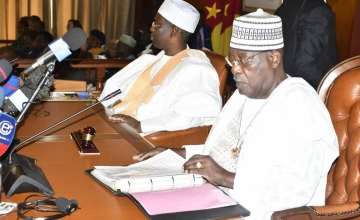_archives_1111_cameroon-info-p-net_800xm9x.jpg)
CHAPTER I
GENERAL PROVISIONS
- PURPOSE AND SCOPE OF THE LAW
SECTION 1: This law lays down the general legal framework for the promotion of official languages in Cameroon.
SECTION 2: (1) The official languages of Cameroon shall be English and French.
(2) The official languages of Cameroon shall have equal value.
SECTION 3: This law shall apply to ali national public institutions and regional and local authorities.
SECTION 4: The State shall encourage the promotion of official languages in private entities, employers' and labour organizations, civil society organizations and voluntary agencies.
SECTION 5: (1) The purpose of this law shall be to ensure the equal use of English and French in public services and bodies, and to encourage Cameroonians to express themselves in English and French.
(2) Specifically, it seeks to:
- guarantee the systematic use of both official languages as working languages in public entities and services open to the public;
- guarantee the right of every citizen to obtain information and official documents in the language of their choice;
- guarantee the right of every citizen to freely communicate with the Public Administration, and to obtain the services they desire therefrom in the language of their choice;
- guarantee the simultaneous publication and dissemination of legislative and regulatory instruments in both official languages, each version being equally valid;
- promote the teaching of English and French in the educational system.
SECTION 6: (1) Officials of government services and regional and local authorities shall, in the entities under their responsibility, ensure the training of their staff in the use of English and French.
II- DEFINITIONS
SECTION 7: Within the meaning of this law and the measures taken for its implementation, the following definitions shall apply:
(a) Bilingualism: everyday use of the two official languages by Cameroonians;
(b) Public entity: public law corporate body, including the State, public establishments and enterprises and regional and local authorities;
(c) Incentives: al measures taken by the State to promote English and French;
(d) Interpretation: oral translation of a speech or statement as it unfolds, by professionals in the field;
(e) Constitutional organs: institutions such as the Parliament, the Constitutional Council, the Supreme Court, Municipal and Regional Councils, and the Economic and Social Council;
(f) Translation: transposition of a written text or document from one language to another, by professionals in the field.
CHAPTER II
ROLE OF THE STATE
SECTION 8: The State shall guarantee the equality of English and French in all sectors of administrative, economic, social and political activity.
SECTION 9: The State shall ensure the effective use of English and French in government services.
SECTION 10: The State shall en sure that information on manufactured products intended for the public is presented in bath official languages.
SECTION 11: (1) The State shall set up entities to provide training and build capacity in the use of English and French, and provide incentives to enable citizens to develop their proficiency in both languages.
(2) Conditions for the implementation of the incentives provided for in subsection 1 above shall be laid down by separate instruments.
SECTION 12: The promotion of official languages shall be guaranteed through:
- the use and practice of the two official languages in government services;
- the use and practice of the two official languages in teaching and training;
- building the capacity of State employees and citizens in English and French;
- incentives for the practice of bilingualism, in accordance with the laws and regulations of the Republic;
- institution of a national bilingualism day.
CHAPTER III
USE OF OFFICIAL LANGUAGES IN PUBLIC ENTITIES
SECTION 13: (1) English and French shall be the official working languages in public entities.
(2) State employees shall be bound to render services in any of the official languages.
(3) Users shall have the right to ask to be rendered service in any of the official languages.
SECTION 14: Each public entity shall have an internal structure in charge of translation, interpretation and promotion of official languages, run by professional translators and interpreters.
SECTION 15: Users of public entities shall have the right to communicate and interact with the latter in either official language.
SECTION 16: (1) Where delivered in one of the official languages, official speeches and statements by public authorities shall be translated and made public in the other official language.
(2) Without prejudice to the provisions of subsection 1 above, public authorities may use both official languages alternately in official speeches and statements.
SECTION 17: Press articles, press kits and all ether institutional communication documents must be produced and made available in both official languages.
SECTION 18: Signposts, logos, placards and various notices shall be prepared and displayed by all public entities in English and French, with respect to equality of formal presentation in terms of font colour, type and size.
SECTION 19: (1) Official correspondence between public entities shall be written in either of the two official languages.
(2) The header of the documents referred to in subsection 1 above shall be in both official languages and shall respect equality in terms of font colour, type and size.
SECTION 20: Civil status documents and those for the identification of persons as well as State diplomas and certificates of achievement shall be prepared in both official languages.
SECTION 21: Road signs throughout the national territory shall be in both official languages, according to international standards.
SECTION 22: (1) Debates and proceedings within constitutional bodies shall be conducted in either of the two official languages.
(2) Simultaneous interpretation shall be provided during the said debates and proceedings.
SECTION 23: The statements of speakers shall be entered in the minutes of debates of constitutional bodies in the official language used by the speakers.
SECTION 24: Legislative and regulatory documents of a general nature shall be published in the two official languages throughout the national territory.
SECTION 25: (1) Regional and local authorities shall have translation and interpretation structures.
(2) Where necessary, simultaneous interpretation may be provided during the debates and proceedings of regional and local authorities.
SECTION 26: (1) English and French shall be used indiscriminately 1n ordinary law and special courts.
(2) Court decisions shall be rendered in any of the official languages, depending on the choice of litigant.
CHAPTER IV
MISCELLANEOUS, TRANSITIONAL AND FINAL PROVISIONS
SECTION 27: The State shall ensure the monitoring and evaluation of national policy -on the promotion of official languages through an advisory body set up by a separate instrument.
SECTION 28: Regulatory instruments shall specify, as and when necessary, the conditions of implementation of this law.
SECTION 29: Ali previous provisions repugnant hereto are hereby repealed.
SECTION 30: This law shall be registered, published according to the procedure of urgency, and inserted in the Official Gazette in English and French./-
Paul Biya
President of the Republic
December 24, 2019











